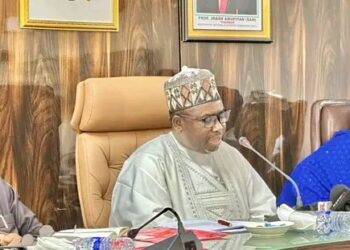By Abubakar Yunusa
The Rivers State Government, on Wednesday, said the renovation of the State House of Assembly Complex was carried out on the advice of consultants, who warned that the building is no longer habitable.
The government said the advice to demolish and restructure the building was predicated on the recent fire that engulfed the allowed chambers and the need to strengthen the long existing complex.
The Commissioner for Information, Joe Johnson, stated this on the sidelines of the presentation of the 2024 budget at the Government House in Port Harcourt.
He said the government hopes to give the renovation accelerated hearing.
Fubara Leads Demolition Exercise
The demolition of the complex was carried out by the state government.
The Complex was demolished amid tight security about two months after fire gutted the complex.
The demolition exercise started at about 6:45am with the state governor, Siminalayi Fubara, leading a convoy consisting of about 10 bulldozers carried on heavy-duty flatbed lorries into the Assembly premises.
Security presence along Moscow road was very tight, with both sides of the road completely cordoned off and blocked to vehicular traffic.
However there was no repeat of the actions of October 30 when the governor was tear-gassed as the policemen allowed foot traffic in and out of the street.
Meanwhile, the Commissioner of Police, Tunji Disu, has convened a security meeting at the Command headquarters with a briefing promised later today.
So far, most facilities on Moscow road remained open.
Furthermore, Fubara presented the N800bn 2024 budget estimates to the Edison Ehie-led group at the Government House the same moment the demolition was carried out.
Ehie was recognised by the court as the Speaker of the House while the court restrained Martins Amaewhule from parading himself as the speaker.
The presentation of the budget was held at a hall in the Government House, apparently, due to the “renovation” work at the state assembly complex which started Wednesday morning.










